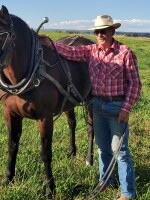If you’re in charge of fetching groceries for your outfit, you have probably noticed that your grocery bill has gone up not only for non-food items, but for the basics, like meat, vegetables, fruit and baked goods. Farmers and ranchers point out that they’re not causing this inflation, because they’re not getting higher prices for what they produce and sell to processors. Economists agree that the problem is caused by lack of workers in processing sheds, slaughter plants, warehouses, trucking firms, and even grocery stores.
Farmers, especially in the Midwest have seen input costs skyrocket over the past couple of months. Although fertilizer costs leveled off recently, the price of some fertilizers are at record high levels. So the recent announcement that Bayer AG declared a Force Majeure for glyphosate, is more bad news for farmers who use the herbicide to control weeds in corn, soybeans and other glyphosate resistant crops. In essence, the declaration of a Force Majeure states that the company isn’t going to fulfill contracts for delivery of the herbicide, and it ain’t their fault. Although there are other sources of the herbicide, the price will surely rise, and shortages of the chemical will make it tough for farmers who have depended on the herbicide to control weeds without having to use more expensive and time consuming mechanical cultivation several times during the growing season.
According to the United Nations Environment Program, livestock production contributes about 32% of human-linked methane, which is a popular target for climate activists who often point to farting cows as the leading cause of human-caused climate change. But there are several companies that are working on products they claim will reduce this nasty habit. The Dutch bioscience company, Royal DSM is offering Bovaer a synthetic feed additive that inhibits cows’ methane production. The company claims that just a quarter teaspoon of Bovaer per cow per day suppresses the enzyme that triggers methane production in a cow’s rumen. Research at the University of California-Davis has shown that feeding 3 ounces of asparagopsis or red seaweed per cow per day cuts methane production by more than 80%. Optimism about seaweed as a methane-busting feed additive has spurred development of red seaweed farms on the coasts of Australia, Hawaii and North America. Kowbucha,was developed by New Zealand’s Forterra dairy cooperative. No I’m not kidding, just because it sounds kind of like kombucha, this product alters the digestive processes that produces methane in cows.
Farmers and ranchers may be interested in the Livestock & Forage Grower Update offered by Colorado State University Extension on February 17th, with a virtual meeting starting at 9 a.m. that will cover topics, including Wolves in Colorado, grasshoppers, carbon markets, and a NOAA climate outlook report. An in-person meeting will also be offered starting at 1 pm on the 17th in Dove Creek. Topics include Alfalfa weevil management and the eRams Irrigation Management Tool. Call the Dolores County Extension office at 970-677-2283 or the Montezuma County Extension office at 970-565-3123 for more information or to register for either or both of these meetings.
John William Gardner social activist and former secretary of health, education, and welfare wrote, “Much education today is monumentally ineffective. All too often we are giving young people cut flowers when we should be teaching them to grow their own plants.



